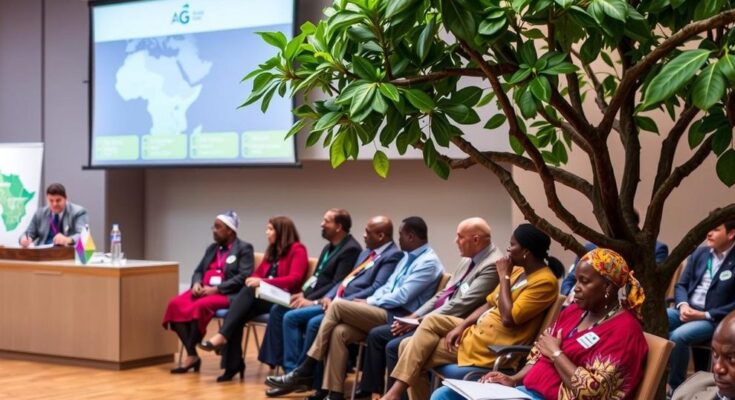The 2024 NGOs Forum highlighted pressing human rights issues faced by civil society in Africa, focusing on education and the protection of human rights defenders amidst growing repression. Participants created recommendations for the African Commission and adopted several resolutions addressing specific conditions in different countries, aiming for increased civic space and alignment with international standards.
From October 13 to 15, 2024, civil society members engaged in the NGOs Forum at the Sir Dawda Kairaba Jawara International Conference Center in Banjul, The Gambia. The forum centered around the African Union’s theme for the year: ‘Educate an African Fit for the 21st Century’, exploring ways to enhance inclusive education across Africa. Participants partook in 16 panels and formed 14 Special Interest Groups to devise recommendations for submission to the African Commission. Highlighting the pressing issues within human rights frameworks, speakers urged for supportive roles of civil society amidst escalating socio-political crises and aggression against human rights defenders. Solomy Bossa emphasized the importance of unity among NGOs instead of labelling them as foreign agents. Critically, Maximillien Ngo Mbe pointed out the detrimental impact of conflicts and terrorism on African children’s access to education, advocating for universal engagement to ensure no child is left behind. The perilous state faced by human rights defenders took center stage, with calls for better working conditions amidst state-sponsored intimidation. Defenders are increasingly targeted, experiencing harassment, arrests, and oversight. Central Africa’s situation mirrored this peril; women defenders and those focusing on civil rights face serious threats, while the DRC recently rescinded the death penalty moratorium affecting abolitionists. In various regions, civic space suppression was rampant, aggravated by state repression. Northern African defenders grapple with severe repercussions under counterterrorism laws, while West African nations see defenders endangered by insecurity and military rule. The ‘zero woubi en Côte d’Ivoire’ campaign marked ongoing discrimination against sexual minorities, exacerbating risks for defenders advocating both sexual and human rights. During a discussion on the Declaration +25, participants recognized its essential role in ensuring national laws align with international standards for rights defenders. They advocated for the African Commission to incorporate this framework into its daily activities, enhancing engagement with civil societies. Continued legal discussions could pivot around national and regional support for upholding the Declaration’s principles, despite some governmental resistance. The Forum culminated in the adoption of critical resolutions covering human rights defenders’ protection, civic space enhancement, and addressing the death penalty in specific regions. The resolutions voiced particular concerns in DRC, Uganda, Zimbabwe, Guinea, Tunisia, and Egypt while emphasizing education rights and decriminalization of petty offenses across Africa. Discussions on environmental rights were also raised, signaling the necessity for comprehensive frameworks addressing defenders’ safety and civic freedom.
The outcomes of the Forum revolved around the incorporation of civil society views into the African Commission’s agenda. As various countries face challenges in human rights protections, the Forum aimed to mobilize collective efforts to advocate for defenders and ensure a critical focus on education as a fundamental right. The discussions were framed within the broader context of increasing governmental repression and the necessity of aligning national laws with international human rights standards.
The 2024 NGOs Forum in The Gambia not only highlighted the vital role of civil society but also brought forward pressing human rights concerns related to defenders across Africa. Through collaborative recommendations and resolutions, participants aimed to empower voices advocating for justice, inclusivity, and equitable education. Continued advocacy and legal alignment with international standards remain imperative for fostering a safer environment for human rights defenders throughout the continent.
Original Source: ishr.ch



